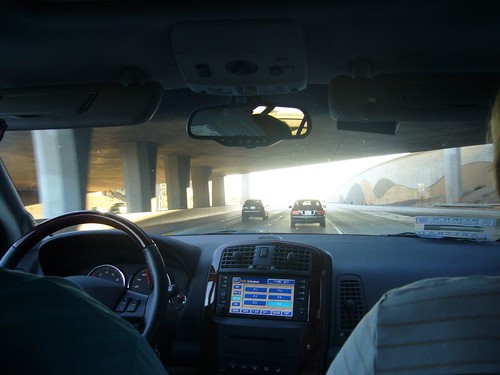11 predictions concerning technology in education
Here is a list of predictions I made in 2001 about the classroom of the future. I’m pleasantly surprised about how accurate it has turned out to be – but I think it will be even more challenging to predict the next ten years because there are so many options opening up. What are your predictions for the next ten years? And is it worth bothering to make such predictions anyway?
 Who knows the road ahead?I think it’s interesting to get pupils’ views on what might be down the road, technologically speaking. When I was teaching I devised a set of lessons around designing the library of the future. Some of the ideas were fantastic – and some have come to pass as well! Science fiction tends to be a good source of ideas about how the future might turn out.
Who knows the road ahead?I think it’s interesting to get pupils’ views on what might be down the road, technologically speaking. When I was teaching I devised a set of lessons around designing the library of the future. Some of the ideas were fantastic – and some have come to pass as well! Science fiction tends to be a good source of ideas about how the future might turn out.
I don’t actually think predicting the future of technological development, which you can extrapolate from the current status quo to a certain extent, is as difficult as predicting how people might use the technology, and what the unintended consequences might be. That’s the real reason I think exercises in future-gazing are important: not to seem clever, but to explore (possibly unimagined) issues and effects.
Anyway, here is that list.
- Much of the technology for the classroom of the "future" actually exists now. The difference in the future will be that it will be much more common and used as a matter of course.
- The classroom of the future will be a "smart" classroom. It should be possible for desks to have computers built into them, much like you can buy rulers and mouse mats with calculators built into them. The computer would know who is sitting at the desk, and log on automatically and produce a menu of options, including "Load last piece of work".
- Connectivity and "embeddedness" will be the guiding principles: connectivity, in the sense that whatever device pupils do their work on will not lead to a cul-de-sac: it will be straightforward to start work on a handheld computer in one place and continue on a laptop somewhere else; embeddedness, in the sense that you won't have to think about what you're using, because it will all be part of the fabric of living. These two ideas are, of course, closely related.
- Schools as such won't disappear, but the widespread use of handheld or laptop computers, the internet and teleconferencing will mean that those who are unable to attend school because of, say, illness, will not be excluded from the learning process. Also, guided learning time will be extended beyond the normal school day.
- Students will complete online lessons and assessments. These will be marked automatically, and the results emailed to both the student and the teacher.
- Students will use hand held computers to read ebooks, or compilations of resources in one or other ebook format. Likely contenders are Microsoft's ebook reader and Adobe's new Palm computer version of PDF -- currently available in a trial version at http://www.adobe.co.uk/betareg.html [this link is now dead, so I have removed it].
- Schools will buy their lessons in a pick-n-mix style from online content providers.
- Schools will print out books and similar resources through the use of print on demand technology, perhaps through a licensing system similar to the one used for photocopying resources at present. (Richard Charkin, chief executive of Macmillan, has warned that the probable take-up of print-on-demand by intermediaries such as libraries is potentially "the
biggest threat facing booksellers.".) - Teachers will continue to be the single most important element in the learning process.
- "Pundits" who plug only one vision of the future will be proved wrong.
- Anyone who produces a list like this will turn out to be wrong!